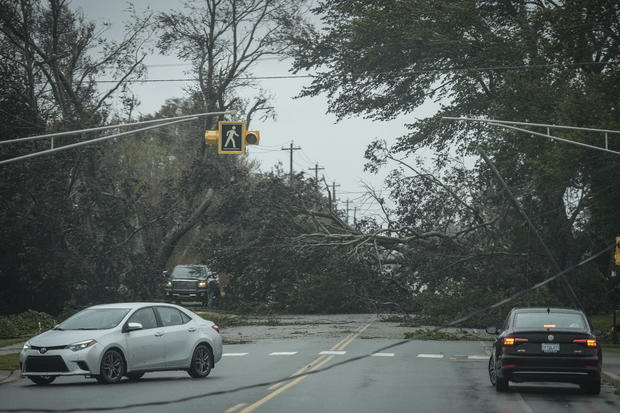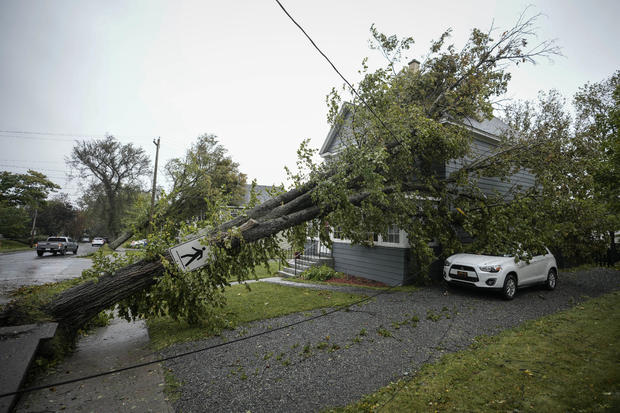Fiona knocks out power and washes away homes in Atlantic Canada
Fiona washed houses into the sea, tore the roofs off others and knocked out power to the vast majority of two Canadian provinces as it made landfall before dawn Saturday as a big, powerful post-tropical cyclone.
Fiona transformed from a hurricane into a post-tropical storm late Friday, but it still had hurricane-strength winds and brought drenching rains and huge waves. There was no confirmation of fatalities or injuries.
Ocean waves pounded the town of Channel-Port Aux Basques on the southern coast of Newfoundland, where entire structures were washed into the sea. Mayor Brian Button said Saturday over social media that people were being evacuated to high ground as winds knocked down power lines.
"I'm seeing homes in the ocean. I'm seeing rubble floating all over the place. It's complete and utter destruction. There's an apartment that is gone," René J. Roy, a resident of Channel-Port Aux Basques and chief editor at Wreckhouse Press, said in a phone interview.
Roy estimated between eight to 12 houses and buildings have washed into the sea. "It's quite terrifying," he said.
Jolene Garland, a spokeswoman for the Royal Canadian Mounted Police in Newfoundland and Labrador, said a woman was safe and in "good health" after being "tossed into the water as her home collapsed" in the Channel-Port Aux Basques area. Garland said that an individual who might have been swept away was still reported as missing and that high winds were preventing an aerial search.
The Royal Canadian Mounted Police said the town of 4,000 people was in a state of emergency as authorities dealt with multiple electrical fires and residential flooding.
Prime Minister Justin Trudeau canceled his trip to Japan for the funeral for assassinated former Prime Minister Shinzo Abe. Trudeau said the federal government would deploy the Canadian Armed Forces to assist.
"We are seeing devastating images coming out of Port aux Basques. PEI (Prince Edward Island) has experienced storm damage like they've never seen. Cape Breton is being hit hard, too," Trudeau said.
"Canadians are thinking of all those affected by Hurricane Fiona, which is having devastating effects in the Atlantic provinces and eastern Quebec, particularly in the Magdalen Islands. There are people who see their houses destroyed, people who are very worried - we will be there for you."
Fiona had weakened to tropical storm strength Saturday night as it moved across the Gulf of St. Lawrence. The U.S. National Hurricane Center said Fiona had maximum sustained winds of 70 mph (110 kph). It was centered about 80 miles (130 kilometers) northwest of Port aux Basques and moving northeast at 8 mph (13 kph). Tropical-storm-force winds extend outward up to 550 miles (890 km) from the center.
"Gradual weakening is expected during the next couple of days," the NHC wrote.
Halifax Mayor Mike Savage said the roof of an apartment building collapsed and they moved 100 people to an evacuation center. He said no one was seriously hurt or killed. Provincial officials said there are other apartment buildings that are also significantly damaged. Halifax has about 160 people displaced from two apartments, officials said.
More than 415,000 Nova Scotia Power customers - about 80% of the province of almost 1 million - were affected by outages Saturday morning. Over 82,000 customers in the province of Prince Edward Island, about 95%, were also without power, while NB Power in New Brunswick reported 44,329 were without electricity.
The Canadian Hurricane Centre tweeted early Saturday that Fiona had the lowest pressure ever recorded for a storm making landfall in Canada. Forecasters had warned it could be the one of the most powerful storms to hit the country.
"We're getting more severe storms more frequently," Trudeau said Saturday.
He said more resilient infrastructure is needed to be able withstand extreme weather events, saying a one in a 100 year storm might start to hit every few years because of climate change.
"Things are only getting worse," Trudeau said.
A state of local emergency was also declared by the mayor and council of the Cape Breton Regional Municipality.
"There are homes that have been significantly damaged due to downed trees, big old trees falling down and causing significant damage. We're also seeing houses that their roofs have completely torn off, windows breaking in. There is a huge amount of debris in the roadways," Amanda McDougall, mayor of Cape Breton Regional Municipality, told The Associated Press
"There is a lot of damage to belongings and structures but no injuries to people as of this point. Again we're still in the midst of this," she said. "It's still terrifying. I'm just sitting here in my living room and it feels like the patio doors are going to break in with those big gusts."
Nova Scotia Premier Tim Houston said roads were washed out, including his own, and said an "incredible" amount of trees were down.
"It is pretty devastating. The sad reality is the people who need information are unable to hear it. Their phones are not working, they don't have power or access to the internet," Houston said.
Peter Gregg, President and CEO of Nova Scotia Power, said unprecedented peak winds caused severe damage. "In many areas, weather conditions are still too dangerous for our crews to get up in our bucket trucks," Gregg said. He said about 380,000 customers remain without power as of Saturday afternoon.
Prince Edward Island Premier Dennis King said they had no reports of any significant injuries or deaths. But he said few communities were spared damage, with the devastation looking to be beyond anything they had seen previously in the province. He said over 95% of islanders remained without power.
Federal Minister of Emergency Preparedness Bill Blair said there was very extensive damage at the airport in Sydney, Nova Scotia. He said other airports also were hit, but that damage at the Halifax facility, Nova Scotia's largest airport, was minor.
Hurricanes in Canada are somewhat rare, in part because once the storms reach colder waters, they lose their main source of energy. But post-tropical cyclones still can have hurricane-strength winds, although they have a cold core and no visible eye. They also often lose their symmetric form and more resemble a comma.
Fiona so far has been blamed for at least five deaths — two in Puerto Rico, two in the Dominican Republic and one in the French island of Guadeloupe.
In the Caribbean, Tropical Storm Ian was predicted to rapidly strengthen and hit Cuba early Tuesday as a hurricane and then hit southern Florida on Wednesday or Thursday, the U.S. National Hurricane Center said.

